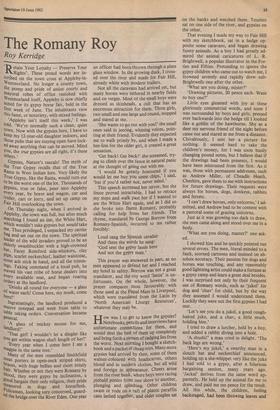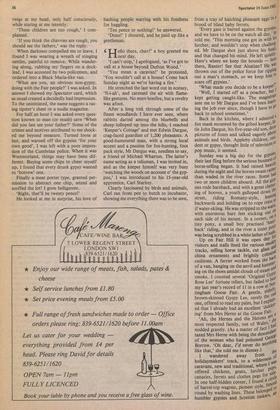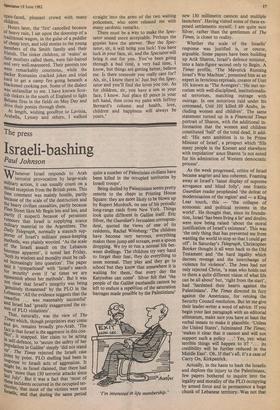The Romany Roy
Roy Kerridge
IIetain Your Loyalty — Preserve Your ■ Rights'. These proud words are in- scribed on the town cross at Appleby-in- Westmorland. No longer a county town, the pomp and pride of assize courts and Mayoral robes of office vanished with Westmorland itself, Appleby is now chiefly noted for its gypsy horse fair, held in the first week of June. The inhabitants view this fame, or notoriety, with mixed feelings. `Appleby isn't itself this week,' I was told. `We're normally such a clean, quiet town. Now with the gypsies here, I have to keep my 12-year-old daughter indoors, and those pubs that are staying open have lock- ed away anything that can be moved. Mind You, the true gypsies are all right, it's these others.'
Gypsies, Nature's rascals! The myth of the True Gypsy recalls that of the True Rasta in West Indian lore. Very likely the True Gypsy, like the Rasta, would turn out to be the worst one of the lot. Thousands of 8Ypsies, true or false, pour into Appleby every year, by horse and wagon, car and trailer, cart or lorry, and set up camp on Fair Hill overlooking the town. On Thursday night, when I arrived in Appleby, the town was full, but after much Searching I found an inn, the White Hart, Which wouldn't take gypsies but would take rine. Thus privileged, I unpacked my carrier leader and set out on the town. The spiritual leader of the wild invaders proved to be an elderly swashbuckler with a high-crowned hat, Facey Romford side-Whiskers, clay Pipe, scarlet neckerchief, leather waistcoat, stout ash stick in hand, and all the trimm- ings. Taking command of a local pub, he Waved his vast tribe of horse dealers into every available seat, and began roaring orders at the landlord.
`brinks all round for everyone — a glass of water each! Come here, my mush, come here!'
Ingratiatingly, the landlord produced a Illative notepad and went from table to table taking orders. Conversation became general.
'A glass of mickey mouse for me, landlord!'
`That girl! I wouldn't let a dingier like You get within wagon shaft length of her!' Every year when I come here I see a Magpie in the same tree.'
Many of the men resembled Smithfield eat porters in open-neck striped shirts, i'fraces, with huge bellies and short bristly ku,alr. Whether or not they were Romany by ulood, they were gypsy by inclination, a good bargain their only religion, their pride measured in dogs and horseflesh. Policemen, looking very concerned, guard- ed the bridge over the River Eden. One year an officer had been thrown through a plate glass window. In the growing dusk, I cross- ed over the river and made for Fair Hill, already white with modern trailers.
Not all the caravans had arrived yet, but many horses were tethered in nearby fields and on verges. Most of the small boys were dressed as skinheads, a cult that has an enormous attraction for them. Three girls, two small and one large and round, stopped and stared at me.
`She wants to go out with you!' the small ones said in jeering, whining voices, poin- ting at their friend. Evidently they expected me to walk primly by, and when I made a bee-line for the older girl, it created a great sensation.
`Get back! Get back!' she screamed, try- lng to climb over the fence in natural panic at the thought of going out with me. 'I would be greatly honoured if you would let me buy you some chips,' I said, `but if you'd rather not, never mind.' This speech increased her terror, but the fence proved intractable. I had to retrace my steps and walk past her if I wanted to see the White Hart again, and as I did so she broke into fluent Romany, probably calling for help from her friends. The rhyme, translated by George Borrow from Romany-Spanish, occurred to me rather forcibly: Loud sang the Spanish cavalier And these the words he sang: `God sent the gypsy lassie here And not the gypsy man.'
This prayer was answered in part, as no men appeared to defend her and I reached my hotel in safety. Borrow was not a great translator, and the coy word `lassie' is un- fortunate. On the whole, however, the prayer compares most favourably with those used at the Papal Mass in Liverpool, which were translated from the Latin by `North American Liturgy Resources', whatever they may be.
How was Ito get to know the gypsies? Notebooks, pencils and interviews have unfortunate connections for them, and would shut the best of them up completely and bring forth a stream of cadging lies from the worst. Next morning I bought a sketch- book and a packet of cheap toys. Many more gypsies had arrived by then, some of them walnut-coloured with headscarves, others blond and in modern clothes, but all wild and foreign in appearance. Cheers arose from the river bank, where boys were racing piebald ponies from one shore to another, plunging and splashing. Other children swain or rode on a raft of plastic paraffin cans lashed together, and older couples sat on the banks and watched them. Tourists sat on one side of the river, and gypsies on the other.
That evening I made my way to Fair Hill with my sketchbook, sat in a hedge op- posite some caravans, and began drawing funny animals. As a boy I had greatly ad- mired the animal caricatures of L. R. Brightwell, a popular illustrator in the For- ties and Fifties. Pretending to ignore the gypsy children who came out to watch me, I frowned severely and rapidly drew sub- Brightwells one after the other.
`What are you doing, mister?'
`Drawing pictures, 20 pence each. Want to buy one?'
Little eyes gleamed with joy at these gloriously commercial words, and soon I was surrounded by boys and girls, pressed ever backwards into the hedge till I looked like a goblin of the hawthorns. Shy as a deer my nervous friend of the night before came out and stared at me from a distance. Chivalrously, I sent her a picture for nothing. It seemed hard to take the children's money, for I was soon busily changing pound notes, but I believe that if the drawings had been presents, I would have been mistrusted from the first. As it was, those with permanent addresses, such as Andrew Miller, of Cheadle Heath, Cheshire, gave them to me with instructions for future drawings. Their requests were always for horses, dogs, donkeys, rabbits and ferrets.
`I can't draw horses, only unicorns,' I ad- mitted, and Andrew had to be content with a pastoral scene of grazing unicorns.
Just as it was growing too dark to draw, the men came along and stood over me in a body.
'What are you doing, master?' one ask- ed.
I showed him and he quickly pointed out several errors. The men, literal-minded to a fault, scorned cartoons and insisted on ab- solute accuracy. Their passion for dogs and horses was touching, and any reasonably good lightning artist could make a fortune at a gypsy camp and learn a great deal besides. I was surprised not only by their frequent use of Romany words, such as `juke for dog and 'chav' for child, but by the way they assumed I would understand them. Luckily they were not the first gypsies I had met.
`Let's see you do a jukel, a good rough- haired juke, and a chav, a little mush, holding him.° I tried to draw a lurcher, held by a boy, and added a rabbit diving into a hole.
shushi!' a man cried in delight. `The back legs are wrong.'
`Here's my jukel,' a swarthy man in a slouch hat and neckerchief announced, holding up a she-whippet very like the juke I had sold to a gypsy, after a hilarious bargaining session, many years ago. `Jackal' derives from the same word ap- parently. He held up the animal for me to draw, and paid me ten pence for the result. All this while, the children, feeling backstaged, had been throwing leaves and twigs at my head, only half consciously, while staring at me intently.
`These children are too rough,' I com- plained.
'If you think the chavvies are rough, you should see the fathers,' was the reply.
When darkness compelled me to leave, I found I was wearing a wreath of stinging nettles, painful to remove. While wander- ing along, rubbing my fingers on a dock- leaf, I was accosted by two policemen, and ordered into a Black Maria-like van.
'What are you, an obvious non-gypsy, doing with the Fair people?' I was asked. In answer I showed my Spectator card, which as usual created a decidedly bad impression. To the uninitiated, the name suggests a rac- ing tipster's sheet or a nudie magazine.
For half an hour I was asked every ques- tion known to man (or mush) save 'When did you last see your father?' Some of the crimes and motives attributed to me shock- ed me beyond measure. Turned loose at last, and warned off the gypsies 'for your own good', I was left with a poor impres- sion of the Cumbrian police. When it was Westmorland, things may have been dif- ferent. Buying some chips to cheer myself up, I found that every drunk gypsy wanted to 'borrow' one.
Finally a meat porter type, granted per- mission to abstract one chip, seized and scoffed the lot! I grew belligerent.
`Right, that'll be twenty pence!'
He looked at me in surprise, his love of bashing people warring with his fondness for haggling.
`Ten pence or nothing!' he answered. 'Done!' I shouted, and he paid up like a gentleman.
Hello there, chav!' a boy greeted me next day. `I can't stop,' I apologised, 'as I've got to call at a house beyond Dufton Wood.'
`You mean a caravan!' he protested, `You wouldn't call at a house! Come back Sunday night as we're having a fire.'
He stretched the last word out in ecstasy, and caressed the air with flame- like gestures. No mere bonfire, but a revelry was afoot.
After a long trek through some of the finest woodlands I have ever seen, where rabbits darted among the bluebells and sheep lolloped up into the hills, I reached `Keeper's Cottage' and met Edwin Dargue, crag-faced guardian of 1,200 pheasants. A good-humoured man, with a strong local accent and a passion for fox-hunting, foot pack style, Mr Dargue was, needless to say, a friend of Michael Wharton. The latter's name acting as a talisman, I was invited in, and as the keeper himself was very busy 'watching the woods on account o' the gyp- pos,' I was introduced to his 15-year-old apprentice, Carl Starkey.
Clearly fascinated by birds and animals, Carl ran from pen to hutch to incubator, showing me everything there was to be seen, from a tray of hatching pheasant eggs to a brood of blind baby ferrets.
`Every gate is barred against the gypsies, and we have to be on the watch all day,' he told me. 'This morning one got in with his lurcher, and wouldn't stop when challeng- ed. Mr Dargue shot just above his head, and that changed his mind. He left Here's where we keep the hounds — here there, Ranter! See that Alsatian? He 05 thrown out of the police force for riPPing out a man's stomach, so we keep himscare off gypsies.' quietly
`What made you decide to be a keeper?:
`Well, I started off as a poacher, but ' kept getting caught-like. The magistrate sent me to Mr Dargue and I've been learn" ing the job ever since, though I have to S back to school sometimes.' Back in the kitchen, where I admired 3 fox mask mounted by the gifted keeper, tle John Dargue, his five-year-old son, drew: pictures of foxes and talked eagerly ah°1j: animals and birds. Appleby children, res' dent or gypsy, thought little of television or pop music, it seemed. Sunday was a big day for the gypsies' c their last fling before the serious business 0' horse-selling began. It had rained heavily during the night and the horses swam rather than waded in the river races. Some had two or more children aboard. All the go- sies rode bareback, and with a great clatter; ing of hooves, a youth galloped down .r"h; street, riding Romany-style, leaning backwards and holding on to rope reins ats if water-skiing. He was stripped to the vvais;: with enormous bare feet sticking out 0"a each side of his mount. In a corner, 011 t tiny pony, a small boy practised back' riding, and in the river a tinier po, was being scrubbed in a white lather of suds" Up on Fair. Hill it was open day I:r visitors and stalls lined the various nlouYd tracks, selling horse tackle, cut glass and china ornaments and brightly eolourek cushions. A farrier worked from the hac.,, of a van, banging on the anvil and hammed ing on the shoes amidst clouds of steam all smoke. I counted several 'Original GYPat Rose Lee' fortune tellers, but failed to besy my last year's record of 11 in a row at tingham Goose Fair. A gentle, eldel brown-skinned Gyspy Lee, surely the re.n, one, offered to read my palm, but I exP131r ed that I already had an excellent 'child° - ing' from Mrs Herne at the Goose Fair' a `Ah, the Hernes and the Herons ache most respected family, out of Wales,' hat taxed gravely. (As a matter of fact I not taxed Mrs Herne with being the descend° e of the woman who had poisoned George Borrow. 'Oh dear, I'd never do anYwr like that,' she told me in dismay.) the I wandered away from of holidaymakers' track, to a wilderness s caravans, new and traditional, where I os, offered chickens, goats, lurcher pup canaries, ferrets and clothes pegs for s. etc In one half-hidden corner, I found a aced of barrel-top wagons, pioneer style, fen, ,0 round by washing lines. These belonge0_,`, humbler gypsies and Scottish tinkers, "`'
open-faced, pleasant crowd with many children.
Hours later, the 'fire' cancelled because of heavy rain, I sat upon the doorstep of a traditional wagon, in the guise of a peddler of cheap toys, and told stories to the young members of the Smith family and their friends. The tinker children, or `wains' as their mothers called them, were fair-haired and very well-mannered. Their parents too were remarkably courteous, while the darker Romanies cracked jokes and tried hard to get a camp fire going beneath a blackened cooking pot. Some of the dialect Was unfamiliar to me. I have known Scot- tish tinkers in the south of England to light Beltane fires in the fields on May Day and drive their ponies through them.
At length, wishing goodbye to Lavinia, Arabella, Lynsey and others, I walked straight into the arms of the two waiting policemen, who soon released me with many sardonic remarks.
There must be a way to make the Spec- tator sound more acceptable. Perhaps the gypsies have the answer. 'Buy the Spec- tator, sir, it will bring you luck! You have luck in your face, sir, and the Spectator will bring it out for you. You've been going through a bad time, a very bad time, I know, but things are getting better, believe me. Is there someone you really care for? Ah, sir, I know there is! Just buy the Spec- tator and you'll find she loves you too. As for children, sir, you have a son in your face, I know. Just place 65 pence in your left hand, then cross my palm with Jeffrey Bernard's column and health, love, children and happiness will always be yours.'






































 Previous page
Previous page